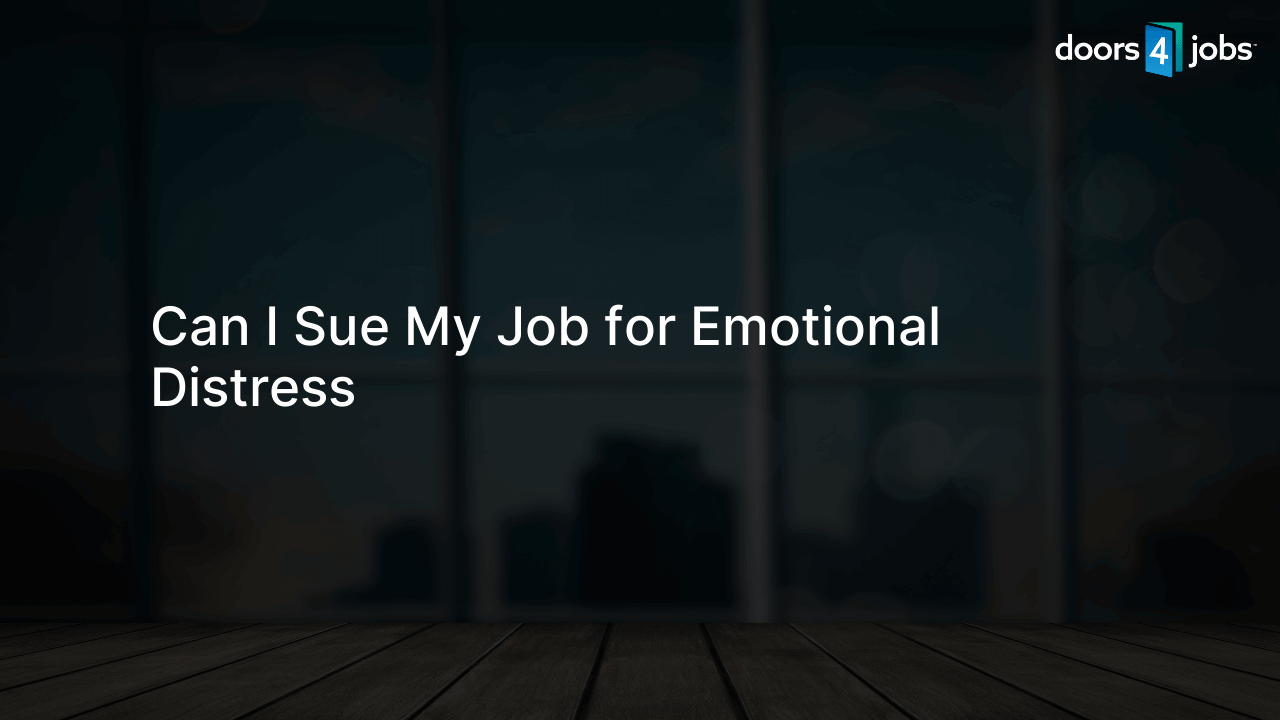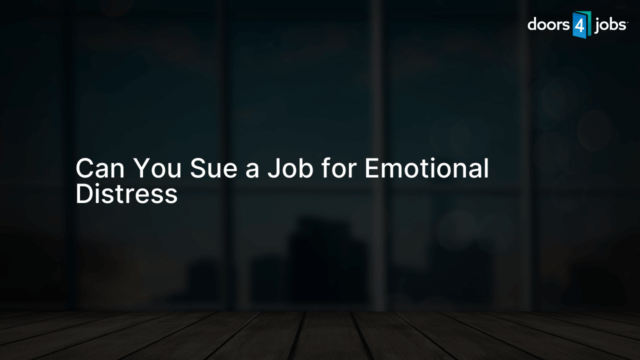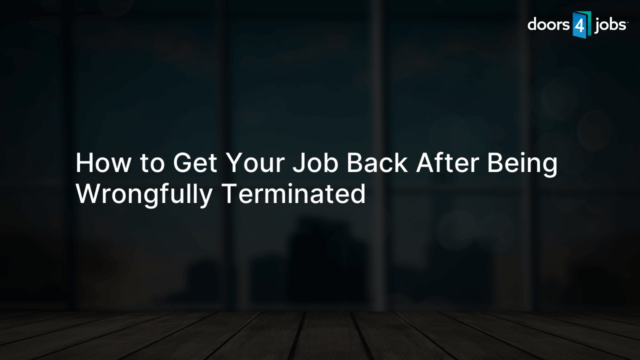Yes, you can potentially sue your employer for emotional distress if their actions were intentional or recklessly caused you emotional harm. However, the circumstances must meet specific legal requirements, and you need to prove that your employer acted beyond the scope of normal workplace behavior and that the distress suffered was severe and long-lasting.
Understanding Emotional Distress Lawsuits
Emotional distress lawsuits involve a plaintiff seeking compensation for the severe emotional suffering caused by another individual’s actions. It’s essential to understand that not all unpleasant workplace experiences qualify for this type of lawsuit. The legal requirements must be satisfied, and the distress should be more than the usual stress associated with work.
Intentional Infliction of Emotional Distress
One claim you may have for suing your employer for emotional distress is Intentional Infliction of Emotional Distress (IIED). This occurs when the employer’s conduct is deliberate, extreme, and outrageous, going beyond normal workplace behavior and causes severe emotional turmoil.
Requirements for IIED
To prove an IIED case, you need to meet the following legal criteria:
- Outrageous and extreme behavior by the employer
- Intentional or reckless conduct causing emotional distress
- The emotional distress must be severe
- A direct link between the employer’s conduct and the distress suffered
Negligent Infliction of Emotional Distress
Another potential claim is Negligent Infliction of Emotional Distress (NIED). This type of case occurs when an employer’s negligence causes emotional distress to an employee.
Requirements for NIED
In an NIED case, you need to fulfill these legal criteria:
- The employer had a duty of care towards the employee
- A breach of that duty by the employer
- The breach caused the employee’s emotional distress
- The distress was reasonably foreseeable
Steps to Take If Considering a Lawsuit
If you believe you have a valid emotional distress case against your employer, follow these steps in the process:
- Consult with an employment law attorney to assess the merits of your case
- Document the incidents that caused your emotional distress
- Gather evidence, including medical records or witness statements
- File a complaint with the appropriate agencies before taking legal action (e.g., the Equal Employment Opportunity Commission)
- File the lawsuit within the statute of limitations
Worker’s Compensation and Emotional Distress
In some cases, you may be able to claim worker’s compensation for emotional distress caused by work-related events. Worker’s compensation is designed to cover injuries and illnesses that occur within the scope of employment, and it may include psychological injuries, depending on your state’s laws.
Discrimination and Harassment Claims
If you believe the emotional distress you’ve endured is a result of discriminatory or harassing behavior by your employer, you can also file claims under Title VII of the Civil Rights Act or other anti-discrimination laws. In cases involving gender-based harassment, the Equal Pay Act may also apply.
Potential Damages in an Emotional Distress Lawsuit
Should your emotional distress claim be successful, you may be entitled to various types of damages to compensate for your suffering. These might include:
- Compensatory damages, which cover the monetary losses incurred due to distress (medical expenses, lost wages, etc.)
- Non-economic damages for pain, suffering, and emotional turmoil
- Punitive damages in circumstances where the employer acted maliciously or with willful disregard
Hiring a Qualified Employment Law Attorney
Taking on an emotional distress lawsuit against your employer can be a complex and challenging process. Hiring a qualified employment law attorney to guide you is crucial. An experienced lawyer will work to present the strongest case possible on your behalf and advocate for your best interests throughout the legal process.
FAQ: Emotional Distress Lawsuits Against Employers
Many readers have questions when it comes to cases involving emotional distress in the workplace. To help address some of these common concerns, we’ve compiled a list of frequently asked questions and concise answers related to suing your employer for emotional distress.
What constitutes outrageous and extreme behavior in a workplace setting?
Outrageous and extreme behavior generally refers to actions that go well beyond the ordinary bounds of what is deemed acceptable, such as intentional infliction of emotional or psychological harm, harassment, or threats of physical harm. Each case is unique, and a court will weigh the specific circumstances before determining if the behavior qualifies as outrageous and extreme.
How long does it take to resolve an emotional distress lawsuit?
The duration of an emotional distress lawsuit can vary, but most cases take months or even years to reach a resolution. Factors like the complex nature of the claim, court schedules, and the need for expert testimony may contribute to the length of time it takes to resolve these cases.
What is the statute of limitations for emotional distress claims?
Statutes of limitations for emotional distress claims vary by state and the type of claim (IIED or NIED). Typically, they range between one and three years from the date of the incident(s) causing the emotional distress. Consult with an employment law attorney to determine the specific timeline in your jurisdiction.
Can an employer be held liable for emotional distress caused by a coworker?
In some cases, an employer can be held liable for emotional distress caused by a coworker if the employer had knowledge of the behavior, failed to take appropriate action, or if the coworker was in a supervisory position and the emotional distress was a result of that relationship. Essentially, the employer’s negligence or inaction would have to be a contributing factor.
Does worker’s compensation cover emotional distress caused by a coworker or supervisor?
Workers’ compensation coverage for emotional distress caused by a coworker or supervisor depends on the specific laws in your state. Some states do cover emotional distress under workers’ compensation; however, there may be certain criteria for eligibility, such as demonstrating a strong connection between the distress and the work environment. Consult with a qualified attorney to discuss your situation and available options.











